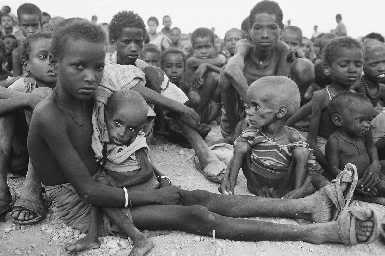
The UN Children's Fund has delivered a dire warning that 75,000 children in Nigeria will die over the next year.
As many as 75,000 children will die in Nigeria over the next year in famine-like conditions created by Boko Haram if donors don't respond quickly, the UN Children's Fund warns.
The severity of malnutrition levels and high number of children facing death make the humanitarian crisis confronting northeastern Nigeria perhaps the worst in the world, according to Arjan de Wagt, nutrition chief for UNICEF in Nigeria.
Most severely malnourished children die of secondary illnesses like respiratory infections, de Wagt told The Associated Press. "But with famine, you actually die of hunger,'' and that is what is happening, he said.
Severe malnutrition is being found in 20, 30 and even 50 per cent of children in pockets of the region, he said.
UNICEF on Thursday doubled the amount of its appeal for Nigeria, saying $US115 million ($A150 million) is needed to save children whose "lives are literally hanging by a thread.'' Only $US24 million ($A31 million) has been raised so far, the agency said.
The lack of money has meant some 750,000 people living in accessible areas could not be helped this year, spokeswoman Doune Porter told the AP.
Most of the estimated 2.6 million people who fled Boko Haram's insurgency are subsistence farmers who have been unable to plant for two years or more.
SOURCE: AAP


